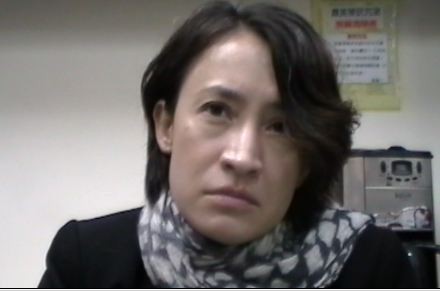|
Legislator Hsiao Bi-khim
says political prosecutions threaten Taiwan¡¦s democracy
January 16, 2013 By: Michael Richardson
http://www.examiner.com/article/legislator-hsiao-bi-khim-says-political-prosecutions-threaten-taiwan-s-democracy

Legislator Hsiao Bi-khim
Credits: Mary Loan
Taiwan Political Prisoner Report, Jan. 16,
2013. Legislator Hsiao Bi-khim, a rising star in the Democratic Progressive
Party, agreed to discuss the case of imprisoned former President Chen Shui-bian.
However, Hsiao¡¦s remarks on Chen¡¦s trial for alleged corruption led to a larger
discussion about political problems facing Taiwan.
Legislator Hsiao reviewed Chen Shui-bian¡¦s trial, ¡§Matters of the change of
judges or even witnesses that have withdrawn their statements or false testimony
in the process are known facts now have made the trial itself very much
problematic.¡¨
Hsiao continued: ¡§Because the trial itself was unfair, the circumstances of his
incarceration we feel are very much politically motivated. While President Ma
claims that Taiwan is a country with the rule of law, there are so many signs of
political manipulation and political intervention into judicial system.¡¨
¡§This comes in the context of a number of other people. These trials have gone
on for years and years. The government has been trying to drag these trials on
and on to prolong the humiliation or judicial almost-like torture because one¡¦s
reputation is accused of being corrupt. These are people, many who had invested
tremendously into the democratization process in Taiwan. It is almost like
tarnishing an entire movement,¡¨ said Hsiao.
¡§The prosecutors have had trouble producing evidence to back up their
allegations for the wrongful detentions. It is becoming clearer within our
society that there are indeed political motivations behind this.¡¨
¡§We are very worried about moving backwards of Taiwan¡¦s democracy,¡¨ said Hsiao.
¡§There is the judicial persecution of members of the opposition. Another area we
are worried is the eroding freedom of speech. Chinese money is coming in to
influence our media and the government is allowing this to happen, almost
facilitating.¡¨
Legislator Hsiao contrasted dictatorial rule by the Republic of China in-exile
with current events: ¡§In the martial law days it was simply banning any critical
media or imprisoning people. Nowdays it is the combination money, capital, and
the influence of China to maintain control and domination of the media. So we
are getting increasingly one-sided stories and pictures about what is really
happening in Taiwan. There have been a lot of students and professors protesting
against this phenomenon lately.¡¨
¡§The political situation is such that President Ma Ying-jeou¡¦s popularity is so
low we hope that it means a change of political circumstances in a few years,
but we are also worried that the low support rates and his desperation means
that he will get even closer to China,¡¨ warned Hsiao.
¡§There are indications, such as the media acquisition by a pro-China business
tycoon tending to monopolize the media, opening up Taiwan¡¦s infrastructures,
such as airports and other facilities, to Chinese investments. All of these
things really worry us that if President Ma¡¦s own weakness in his popularity and
his poor governance record, that he will speed up the process of integrating
with China. If China were a free and open democracy, maybe for some people that
wouldn¡¦t be such an urgent and dangerous problem. But, the Chinese government as
it is right now and the way our government is headed in integrating itself with
the Chinese really worries us that it could worsen the situation for our former
President.¡¨
Hsiao said, ¡§One challenge we face is the United States government officials
from time to time tell us to have stability across the Taiwan Strait. Of course
we also welcome stability and peace in the area. But it does become problematic
when stability is used as the excuse or the reason to turn away from supporting
democracy or diverse political views within our society.¡¨
Hsiao explained: ¡§It is also problematic when stability is the way to put China
on the top of the agenda and do as the Chinese say. In the long term, if
Americans define their interests as long as something doesn¡¦t irritate the
Chinese it is good for everybody, I think that is a problem. There are things
that we have to do here to defend our democracy, to promote our democracy that
the Chinese are not going to like. We have been disappointed at times when such
efforts here have not been supported by the United States.
¡§We understand there are a lot of interests at stake in the relationship with
China,¡¨ acknowledged Hsiao. ¡§We are not out to provoke the Chinese but what we
want to do is defend our freedom and our democracy¡Kand we do not want to sustain
a stability that limits our freedom.¡¨
¡§We hope the American public will continue to take an interest in Taiwan¡¦s
democracy We feel that the survival of Taiwan¡¦s democracy is a very important
indicator of whether or not the Chinese will ever have a chance at democracy. If
what we have created in Taiwan, a multi-party system, if that fails I cannot
imagine Chinese people having a chance,¡¨ said Hsiao.
¡§Supporting democracy in Taiwan also means supporting democracy in Asia. It also
means supporting the Chinese people in pursuing democracy but suppressing our
democracy or manipulating our political system in a way that is not free and
fair I think would send the wrong message to the rest of Asia.¡¨
¡§We hope that those that take a deeper look at our role in the region will take
a more active role in defending what we have created,¡¨ urged Legislator Hsiao.
|
![]()
![]()
![]()